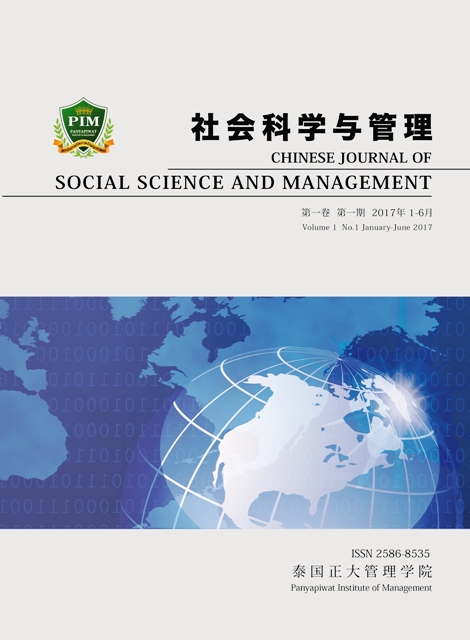ON MODERN TRANSFORMATION OF ANCIENT CHINESE LITERARY THEORY FROM THE PERSPECTIVE OF VARIATIONOLOGY
Main Article Content
Abstract
The disapproval of “the modern transformation of Ancient Chinese Literary Theory”, or taking
it as a meaningless issue, is based on the misunderstanding of “aphasia”. With a review the history of
Chinese literary theory, we can trace the modern transformation of ancient Chinese literary theory, and
the transformation takes place by way of variation. We have three ways of the transformation of Ancient
Chinese Literary Theory: Firstly, to re-read the classic works by following the discourses rule of
“conforming to the classics and bringing forward one’s own points”, and it will generate new ideas in the
modern context; Secondly, to introduce foreign literary theory actively and “foreignizate” it, and integrate
it as part of Chinese literary theory, with the preposition of abiding to the rules of traditional Chinese
discourses and emphasis on the ancient Chinese literary theory; Thirdly, to export ancient Chinese literary
theory actively so as to make it mutate abroad, creating a “return of traveling theory”.
Article Details
Chinese Journal of Social Science and Management Editorial Division
The Office of Research and Development, Panyapiwat Institute of Management
85/1 Moo 2, Chaengwattana Rd., Bang Talat, Pakkred, Nonthaburi 11120, Thailand
Tel. 02 855 01048 E-mail: cjssm@pim.ac.th
References
Cao, S. Q. & Li, W. T. (2006). The study of literary variation in comparative literature. Journal of Fudan University, (1), 79-83. [in Chinese]
Cao, S. Q. & Qiu, M. (2010). The westernization of Chinese literary theory. Journal of the National University of Southwest China (The humanities and social sciences), (1), 229-236. [in Chinese]
Cao, S. Q. & Wang, Q. (2008). The discourse reconstruction of Chinese literary theory. Literature, History & Philosophy, (5), 5-12. [in Chinese]
Cao, S. Q. & Wang, Q. (2010). The dialogue between ancient Chinese literary theory and western contemporary literary theory. The Contemporary Literary World, (3), 4-10. [in Chinese]
Cao, S. Q. (1995). The strategy of Chinese cultural development in the 21st century and the reconstruction of Chinese literary discourse. Oriental Periodicals, (3), 223-237. [in Chinese]
Cao, S. Q. (1996). Literary aphasia and cultural pathology. Debate of Literature and Art, (2), 50-58. [in Chinese]
Cao, S. Q. (2005). The study of comparative literature. Chengdu: Sichuan University Press. [in Chinese]
Cao, S. Q. (2006). A course in comparative literature. Beijing: Higher Education Press. [in Chinese]
Cao, S. Q. (2007). Cultural classics, literary discourse and comparative literature. Academic Monthly, (3), 100-105. [in Chinese]
Cao, S. Q. (2008). Variation: a major breakthrough in the theory of comparative literature. Journal of Zhongshan University (Social sciences), (4), 34-40. [in Chinese]
Cao, S. Q. et al. (2001). Chinese ancient literary discourse. Chengdu: Bashu Publishing House. [in Chinese]
Chen, X. (2003). A review of “the modern transformation of ancient literary theory” since 1996. Literature Review, (7), 94-100. [in Chinese]
Derrida, J. (2005). Grammatologie. translated by Tangjia Wang, Shanghai: Shanghai Translation Press. [in Chinese]
Foucault, M. (1999). Discipline and punish. translated by Liu, B. & Yang, Y. Beijing: The Joint Publishing, 28. [in Chinese]
Gadamer, H. (1999). Truth and method. translated by Handing Hong. Shanghai: Shanghai Translation Press. [in Chinese]
Han, T. S. (1986). A letter to Li Minglu. in Zhou Lianggong. New designs of correspondence: first volume. Changsha: Yuelu Press. [in Chinese]
Jiang, S. Z. (2008). A review of the study of ancient Chinese literary theory for 30 years in the new period. Academic Research, (7), 123-128. [in Chinese]
Liu, F. (1995). Look at the influence of American modernist poetry on contemporary Chinese poetry from Ezra Pound and T.S.Eliot. Foreign Literary Studies, (2), 33-39. [in Chinese]
Poggeler, O. (2004). Let’s talk about Heidegger and Lao tzu. translated by Zhang, X. World Philosophy, (2),103-108. [in Chinese]
Pound, E. (1963). A collection of critical essays. Berkeley: University of California Press.
Pound, E. (1969). Confucius: the great learning, the unwobbling pivot, the analects. New York: New Directions.
Pound, E. (1972). The cantos. New York: New Directions.
Pound, E. (1998). The Pisan cantos. translated by Y. H. Zhao. Guilin: Liiang Press. [in Chinese]
Said, E. W. (1999). Edward Wadie Said’s self-selected essays. translated by Xie, S. B. & Hang, G. et al. Beijing: China Social Sciences Press. [in Chinese]
Snyder, G. (1965). Riprap and Cold Mountain poems. San Francisco: Grey Fox Press.
Tong, Q. B. (2002). Discussing the modern vision of the study of ancient Chinese literature with Mr. Hu
Ming & Mr. Guo Yingde. Chinese Cultural Studies, (The volume of winter), 1-8. [in Chinese]
Tong, Q. B. (2002). The “artistic conception” is said in six different forms. Dongjiang Journal, (3), 1-9. [in Chinese]
Wang, G. W. (1940). The Notes and Comments on Ci Poetry. Shanghai: Kai Ming Book. [in Chinese]
Wang, G. W. (1997). The essays of Wang Guowei: first volume. Beijing: Chinese Literature and History Press. [in Chinese]
Wen, Y. D. (2002). Wen Yiduo’s academic essays. Chengdu: Bashu Publishing. [in Chinese]
Zhang, L. X. (1983). No thorough interpretation for poetry. Literature and Art Studies, (4), 13-17. [in Chinese]
Zheng, M. (1982). The study of poetry and drama in British and American. Beijing: Beijing Normal University Press. [in Chinese]
Zong, B. H. (1981). Strolling in aesthetics. Shanghai: Shanghai People′s Publishing. [in Chinese]


